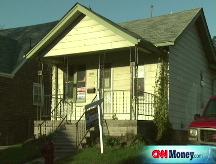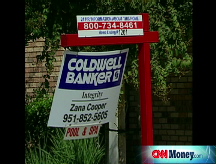Housing starts hit another 17-year low
Home construction and building permits both fall sharply in September to levels not seen since January 1991.
NEW YORK (CNNMoney.com) -- Initial construction of U.S. homes fell to a fresh 17-year low in September, according to a government report released Friday.
Privately owned housing starts fell to a seasonally adjusted annual rate of 817,000 in September, according to the Commerce Department. The rate was down 6.3% from August's revised reading of 872,000 and 31.1% lower than September 2007.
Economists were expecting housing starts to decline to 870,000, according to consensus estimates compiled by Briefing.com.
Housing starts have fallen nearly two-thirds from their peak of 2.3 million in January 2006, and were at the lowest annual pace since January 1991.
"This is bad news for anyone who works in the housing industry, bad news for the economy as a whole, and the decline in housing activity just continues to deepen," said Mike Larson, an analyst for Weiss Research. "This is one of the worst downturns in the housing market in the history of our country."
But as bad as that sounds, it may not accurately portray just how dismal U.S. home construction really is, due partly to a jump in multi-family home starts during the last month. Construction of new multi-family housing actually rose to a rate of 254,000 from 240,000 in September.
New construction of single-family homes, considered the core of the housing market, were at a rate of 544,000, or 12% below August's number. Single-family housing starts have fallen 70% since their peak in January 2006, and have not been at this low a rate since February 1982.
Applications for building permits, considered a reliable sign of future construction activity, fell to a seasonally adjusted annual rate of 786,000 last month. That's 8.3% below the revised 857,000 rate in August, and the lowest level for permits since November 1981.
Economists were expecting permit applications to fall to 840,000.
The sharp fall in building activity suggests that home building will continue to be a drag on the economy for a while. Many economists have identified the battered housing market as the root of the problem behind the recent credit crisis.
But the continued drop in building could actually help the struggling market rebound. Combined with rising foreclosures and a huge number of existing homes on the market, the fact that homebuilders continued to construct new homes well after the housing bubble burst led to an enormous glut of unsold homes on the market.
Since demand for homes remains weak, the glut will only ease if fewer new homes are built.
"As bad as it is, it's what needs to happen," Larson said. "Construction needs to tank to restore equilibrium to supply and demand."
In August, builders faced a median wait of 10.9 months to sell a completed home, according to a separate Census Bureau report issued last month. Accordingly, Larson believes that housing starts will stabilize soon, but a housing rebound won't happen until late 2009 or early 2010, when supply meets demand.
"Low home prices and a decline in starts are helping, but they'll have to be low for some time," Larson added. "A rebound isn't going to happen immediately." ![]()




